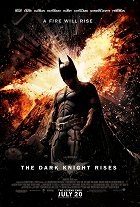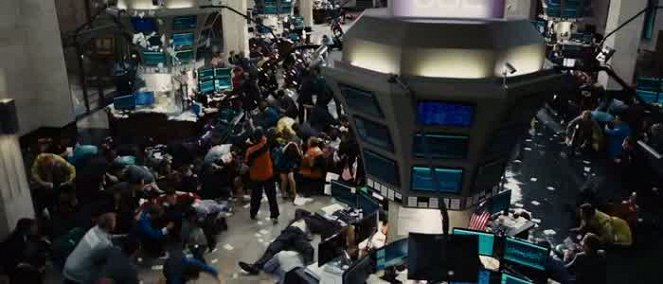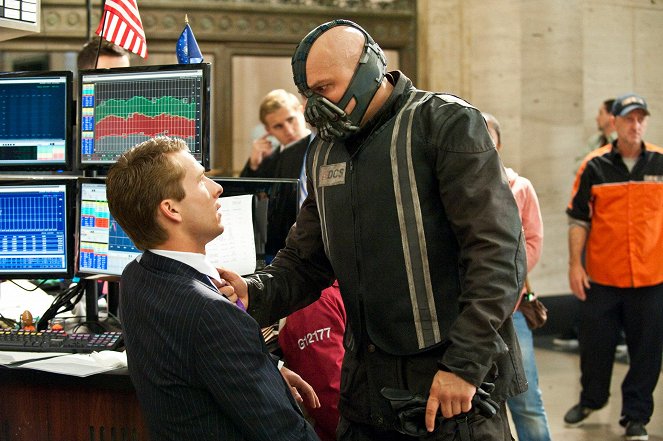Directed by:
Christopher NolanCinematography:
Wally PfisterComposer:
Hans ZimmerCast:
Christian Bale, Gary Oldman, Tom Hardy, Joseph Gordon-Levitt, Anne Hathaway, Marion Cotillard, Morgan Freeman, Michael Caine, Matthew Modine, Alon Aboutboul (more)VOD (4)
Plots(1)
When Commissioner Gordon stumbles upon a plot to destroy the city from within, Bruce Wayne gets back into action as the Batman. Waiting for him is the mysterious Selina Kyle and Bane, a lethal adversary on a crusade to tear apart Batmans legacy piece by piece. (Warner Bros. US)
Videos (46)
Reviews (16)
In the opening scene, the viewer witnesses two prisoners being escorted on an airplane to some prison. The men have bags over their heads and the leader of the escort tries to mentally break one of them and probably force him to confess. He opens the door and pulls the prisoner to his knees facing a bottomless pit that can scare not only those who suffer from a fear of heights. Automatically, I would expect the next step to be the removal of the bag, as otherwise, the act does not make sense. However, that does not happen. The purpose of that bag was not to disorient the prisoner but to surprise the guards and especially the viewer with a moment of revealing the prisoner's identity. In the world of Nolan's Batman trilogy, everything is done for immediate effect and you cannot find any logic or functionality in it. It was only here that I fully understood when it came to The Dark Knight why some people were irritated by the total brevity and stupidity of practically everyone on the set. I also agree with the sentiment that people don't know why The Joker was trying to bring chaos with his plans when in the end he is almost the only one whose actions make sense to some degree. All the others, Batman - the police, and the mafia - exhibit such a heap of insanity that cannot possibly come from a member of the Homo sapiens species equipped with self-preservation instincts. Something like that might belong in a comic book, but this is outwardly presented as a sophisticated detective story with elements of noir and psychological drama. Nolan does not spare any special effects and generously provides attractions, but in terms of content, there's not much to be ha. Batman Begins had the reputation of being a dark drama in which the comic had finally matured and successfully transferred the literary source to the real world. I don't fully agree with that, but I agree that the mentioned tendency was there and that it was an interesting step within the genre. The Dark Knight Rises is evidence that Nolan got stuck in a dead end when it came to grasping the material. It is pompous, megalomaniacal, and content-wise, excuse my language, stupid. Forget about any deeper psychology, this blockbuster only pretends to be mature and is about as good at it as little children playing mommy and daddy. I consider the last part to be unquestionably the weakest part of the trilogy, partly due to very problematic ideological starting points. Frank Miller, the author who has most influenced the current form and mythology of the Batman world, is known as a right-winger and represents a counterbalance to left-leaning anarchist authors like Alan Moore. However, here his individualism and contempt for "scum" has essentially become a manifesto for questioning democratic orders and for authoritarians like Spanish caudillo Franco and especially for General Pinochet, and for them, Batman would undoubtedly be an ideal movie hero and this piece would occupy a very honorable place in their film collections. Overall impression: 25%. If Dunkirk and The Prestige represent the peak of Nolan's work so far, then The Dark Knight Rises represents the bottom.
()
(less)
(more)
“Do you feel in charge?” This is exactly the kind of hard-hitting ending to an epic saga that you would expect from a maximalist like Nolan. With the exception of the overwrought action scenes and the expanded number of characters, Nolan couldn’t take it much farther than he did in The Dark Knight. There was nowhere else to go. So he returned to the roots instead. Batman must rise again, start over and definitively come to terms with the burden that he has carried since Batman Begins, which is represented here by the character of Bane. ___ Whereas the Joker used uncontrollable chaos, Bane employs brute, straightforward physical force. His objective is not to destroy Batman only as a symbol, which is what the maniacal clown managed to do (while his success is reaffirmed when the long-term unsustainability of the status quo built on lies is exposed), but also as a person. The villain and the mistaken and doubting supporting characters again overshadow the titular hero, who admittedly gets more space to deliver his clumsily written lines (with literally expressed thoughts that the film’s creators are unable to convey to viewers simply by hinting at them) without his mask and in his human voice, but his “developmental arc” is merely a variation on that from the first film (with the difference being that his father doesn’t help him out this time) and he is rather predictable in his behaviour (much more so than Bane or the excellent Selina Kyle, whom I’d like to see played by Anne Hathaway in a separate film), just as the rest of the film is predictable. ___ Based on proven narrative formulas, the story generates situations that assault the eye with their calculated nature. The characters’ decisions are not rationalised very well. The degree of care with which the whole film was designed and calculated for effect is apparent in the casualness with which Bruce Wayne puts on the bat costume again after eight years of living in seclusion, the large number of characters appearing in the right place at the right time, and the sudden and correct decisions made by those who had previously been hesitant. Characters make dumb decisions so that Nolan can offer us epic scenes (such as the fight between Batman and Bane) and to serve a particular purpose. Of course, in any fictional film, things naturally don’t happen for any other reason than a conscious decision on the part of the screenwriter, but this fact is more skilfully disguised in other films. ___ Like The Dark Knight, the third instalment is elevated by an uncompromising villain who is well aware of the power of money and of the game (in this case, American football), two phenomena that bring rich and poor together. The villain’s radically Marxist plan with an unclear objective (does he want to destroy Gotham, or leave it to the rabble?) include a forceful attack on both of these pillars of capitalism. Unlike in our reality, the financial crisis in the film is caused by outside interference, not by gradual internal decay, and the culprit is thus easier to identify, track down and punish (e.g. in Skyfall from the same year, whose directing Sam Mendes admits was inspired by The Dark Knight, the evil is of a much more unique nature). However, the attempt to depict the anxieties of today is apparent, but leftist liberals will not be enthusiastic about handing over responsibility to heroic members of the police force. ___ At the stylistic level, Nolan doesn’t come up with anything new, but only clarifies and intensifies what he did before. Nolan again pulls out his favourite shot dyad comprising “static dialogue scene – cut to camera moving over the city with a bird’s-eye view”, the exceedingly epic music of Hans Zimmer is again heard from the opening minutes (and thus cannot be further intensified in the truly important scenes, though the musical motifs assigned to the individual characters and their intertwining work very nicely), and there is again a disconnect between the psychologically believable background and the exaggerated action scenes (the assault on the plane in flight is just as good as the tanks and submarines in the Fast & Furious movies). Thanks to the longer shots and more proportionate use of parallel montages, the hand-to-hand fighting and shootouts are clearer. ___ The structure of The Dark Knight Rises is more ambitious and more clearly arranged than that of the two preceding films. After the fight between Batman and Bane (which happens roughly at the mid-point of the film), there is a fade-out and the initial distribution of powers is overturned. Evil comes to the surface; good is sidelined. In the second half, with its livelier plot, the pace is significantly faster, because there is the necessity of developing motifs and concluding the storylines not only from the first half of the film (the bomb, the removal of Selina from the most-wanted list), but also from the first two films (Ra’s al Ghul, Scarecrow, the lie about Dent), which leads to the sometimes ridiculous attempt to convey truly a lot of information in a short time (I was impressed by the scene in which the characters are waiting for Marion Cotillard’s character to slowly say what she has to say while a bomb ticks a few meters away with only a few tens of seconds remaining until it is set to explode). The narrative, which is made more suspenseful by the establishment of a rapidly shortening deadline (23 days, 18 hours, 45 minutes, then 11 minutes pass, and then five minutes remain), basically doesn’t slow down until the end. In retrospect, the first half thus seems like an eighty-minute, mostly dialogue-driven, character-developing prologue for eighty minutes of thrilling action. ___ The Dark Knight Rises succeeds in being both truly dark and incredibly thrilling, albeit at the cost of unconvincing plot twists, odd confusion of ideas and expressive ponderousness and literalism, but if every attempt at making a monumental cinematic spectacle ended in a similar "failure", I wouldn’t complain. 85% Appendix: A lot of reviews address the speed with which characters travel between the prison and Gotham. According to one of the lines uttered in the film, the prison is located in the “ancient part of the town”, not somewhere in Africa or the Middle East, so it shouldn’t be such a problem to get to Gotham even on foot.
()
(less)
(more)
Until the American anthem was played, this the best I've ever seen in an American blockbuster - for a lot of people this means that they'll be bored for about the first hour, but I enjoyed the masterful tension with which Nolan completely controls the screen. He is able to do so without action, and only with a massively built feeling of restlessness. After the American anthem, I began to have issues with the film - the brothers probably heard the criticism that came down against the Dark Knight's ideological background from the left and seemed to want to settle accounts with supporters of social justice and redistribution. However, they chose a destructive "weapon of choice" - Bane is an enchanting, overwhelming and utterly demonic character that allows Bale’s Wayne / Batman to do what they are strongest at: sacrificing themselves for the film / Gotham. In the end, I was missing more systematic work with the story and characters, the pace is deliberately very impetuous and the dosing out of information is cumbersome. The quite contradictory return to the "comic" mythology of the first film is also quite surprising... The final mega-twist, which weakens Bane's pure evil aura a little, tore me out of a pious ravings about one of the best characters in the trilogy. But I wonder in vain when the last time was that I saw something so overwhelming, monstrous, majestic and yet honed in terms of filmmaking. It was said that Batman would be the king of the season - and despite many objections, he definitely was for me. Edit: Only the second viewing will reveal how consistent and yet emotionally fertile this film is. The IMAX copy is stunning, and the film gains through every detail. Grandiose...
()
The wow! effect of surprise that would mask the heartless treatment of characters is no longer there. Said treatment was still somehow forgivable in the previous instalment, but number three is drowning in it. It is impossible to absorb every twist and its influence on the characters, who are too numerous and keep appearing and disappearing as if on cue, just to do something cool and say a catchphrase (not one of which is worth remembering). Moreover, Christopher Nolan once again (after Inception) underestimates the audience’s intelligence and feeds them cheap non sequiturs. Tom Hardy’s Bane is a dull mountain of muscles. He is interesting thanks to his muzzle and voice, but he does not arouse either fear or respect. The only good thing about Catwoman (or whoever that is) is her pert behind when she rides a motorcycle. The only one who does the best work from the trilogy is Hans Zimmer. He uses the motifs from previous instalments, adds new ones (the Balkan piano from Sherlock for the treacherous Catwoman and anarchist chorales for Bane are invigorating), transforming the flat mass of dark depression from before into a bombastic, orchestrally rich action background. So why am I awarding four stars after all this criticizing? Because the movie still has that colossal quality in which Nolan is unrivaled. You will enjoy being carried away by all that epicness and immense drive, even if you don’t care what is happening or why, or where it will all lead.
()
A monumental film – maybe too much so. It exhausted me as if I’d had to carry Bane on my back for three hours. The Dark Knight Rises has a massive scope, it follows about a billion different characters and the network of motivations and relationships among them it’s never very clear (at least not after watching it once). In all this burnt-out expanse, it needs to resort to various shortcuts (someone always comes and meets someone – without it being clear how they knew that said someone would be there – then they say something important and carry on – repeat and rinse after a bit) and pathetic holy speeches (and I won’t even mention the bus full of orphans), while Bane’s plan and its execution feels very dodgy. Yeah, it’s (only) a “comic book movie” and you also can find similar “comic book” twists, motifs and dialogues in the previous two parts, but here it’s a bit too much and Nolan is trying to take his very realistic concept too far. Naturally, the movie is technically flawless. In the end, it’s the character of Bruce the one who gets most of the attention, so as a conclusion to “his” trilogy, it does work well in all its fatality and epic (8/10). As a standalone film, however, it grinds a little. Let’s hope that in two years Christopher will go for something smaller. PS: Of course, it’s very likely that watching it a second time will make the film feel more cohesive, complex and clear (as usual with Nolan), but I don’t feel like going through it again so soon.
()


